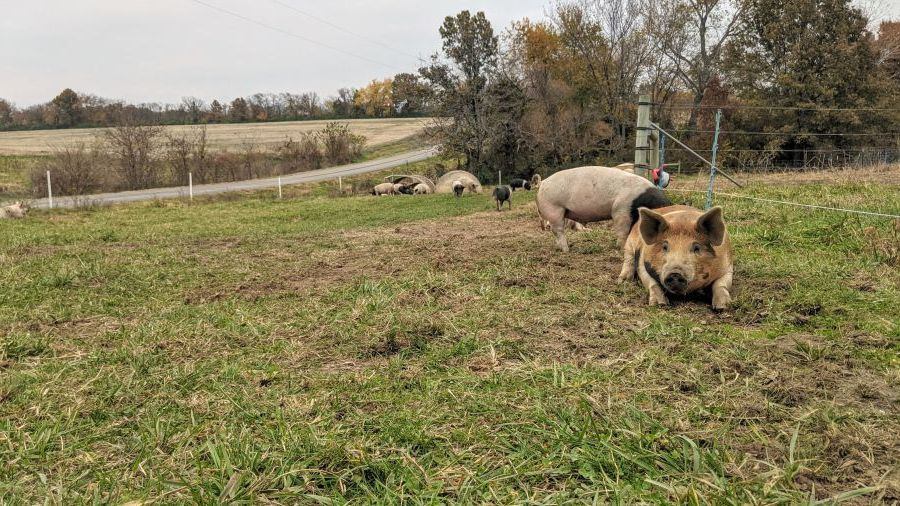From the Foreman's Desk - April Update
posted on
May 2, 2023
On April first, Remi, Cameron, and I packed up the minivan and headed to the KC Healthy Kids Eat Local and Organic Expo. We were able to interact with lots of people.
Events like these are not only a great opportunity to get our name out there and share about home delivery, but it's also a wonderful time to chat with other farms that are also participating. It was encouraging to see so many people come out that care about how their food is raised and how it affects their health and environment.
The vendors were spoiled and had breakfast and lunch provided by The Chive Market & Cafe. Let me just say the food was amazing!

Mid-April, Remi and I took a trip to Indiana for a marketing workshop with GrazeCart and other small farm businesses. Remi was able to walk away with so many helpful tips and ways to improve our business. As soon as we got home, he began working on offering shipping nationwide. That's right! We ship pretty much everywhere now. Sorry if you live in Alaska or Hawaii; you can't order meats, but you can order snack sticks and soap! We also just launched our new Subscribe & Save program. You can set the frequency of your subscription order and save 5% storewide! You can start and stop your subscription anytime. We tried to make it as simple and convenient as a service for you as possible.
On our way back from Indiana, Remi and I stopped in Casey, Illinois. We stayed the night at the 1890 Sleepover. It is a renovated hotel and it was so awesome! I don't have good pictures of it, but I loved imagining what stories the brick walls had to share.
Casey, Illinois is home to several world's largest objects. We were able to see the world's largest wind chimes, rocking chair, mousetrap, key, and even the world's largest mailbox! We mailed a postcard to Remi's siblings from the two-story mailbox. His 5-year-old sister now tells people we went to the world's largest city 😂





The drive home was such a relaxing time to chat and dream. Dreaming is good. It gives you something to aspire for. We talked about dreams for the farm, for our family, and possibly future business ideas. And you bet Remi was trying to figure out how to put something really large on the farm. We're open to suggestions!
I shared about this on social media, but I don't think I've mentioned it on here. I've had a goal with myself to use more whole chickens. We always have them available, and they're very cost-effective. I'll cook one or two in the crock pot, shred them, and then I have cooked chicken ready to freeze or use in quick meals. It has become so handy. Healthy fast food. Another added bonus is the bones to make broth. We have really enjoyed having broth to drink throughout the week. I've also been freezing it to have on hand when the baby comes.

I'm planning on sitting for a good chunk of time during postpartum. So, my goal for May is to stock up on as many freezer meals as I can. I've been learning about the first 40 days. A lot of cultures have a sacred time of rest and nourishment set aside for new mothers to spend with their babies. It allows the body to heal and the mother to bond with the babe. I plan on being very intentional about this.
Unfortunately, modern culture has a tendency to make new mothers feel the need to rush and be out and about as soon as they think they can. It's almost an accomplishment to see how soon you can be moving around with your new little one. If I don't get too stir-crazy, my desire is to rest as much as I can. Hopefully, I can make the full 40 days. I want to let my body heal and restore as much as possible. The ancient Chinese say the first 40 days can affect the next 40 years!
Lots of baby prep going to be happening this month. I've been filling my freezer with broth and my cabinet with herbal remedies. A sweet friend of mine shared her favorite herbal baby oil. I can't wait to use it on Baby K.

May will probably be my last blog post for a bit, besides a brief baby announcement in June!
This past weekend my sister got married! I'm so happy for them 💕 Remi already mentioned in one of his emails that this lovely couple takes care of the hens and washes eggs at the Guier family farm, who produces our eggs. I don't have a picture with the lovely couple, but it was a beautiful wedding and I couldn't be more excited for them.
Remi and I were able to get some pics though, and baby K is finally making himself known.

This coming weekend will involve picking up bulk beef and sorting hogs. Hogs go to the processor on Monday. I don't mind riding along for pickups and deliveries, but I'll probably pass on sorting 😂
I'm really looking forward to this beautiful spring weather and I hope you get a chance to soak it up too!
Pay attention to our Instagram and Facebook posts this week (May 4-6.) We will be doing a giveaway for Farm-to-Table Dinner tickets!
Bye for now 🙂
Kait Kesten - The Real Ranch Foreman



